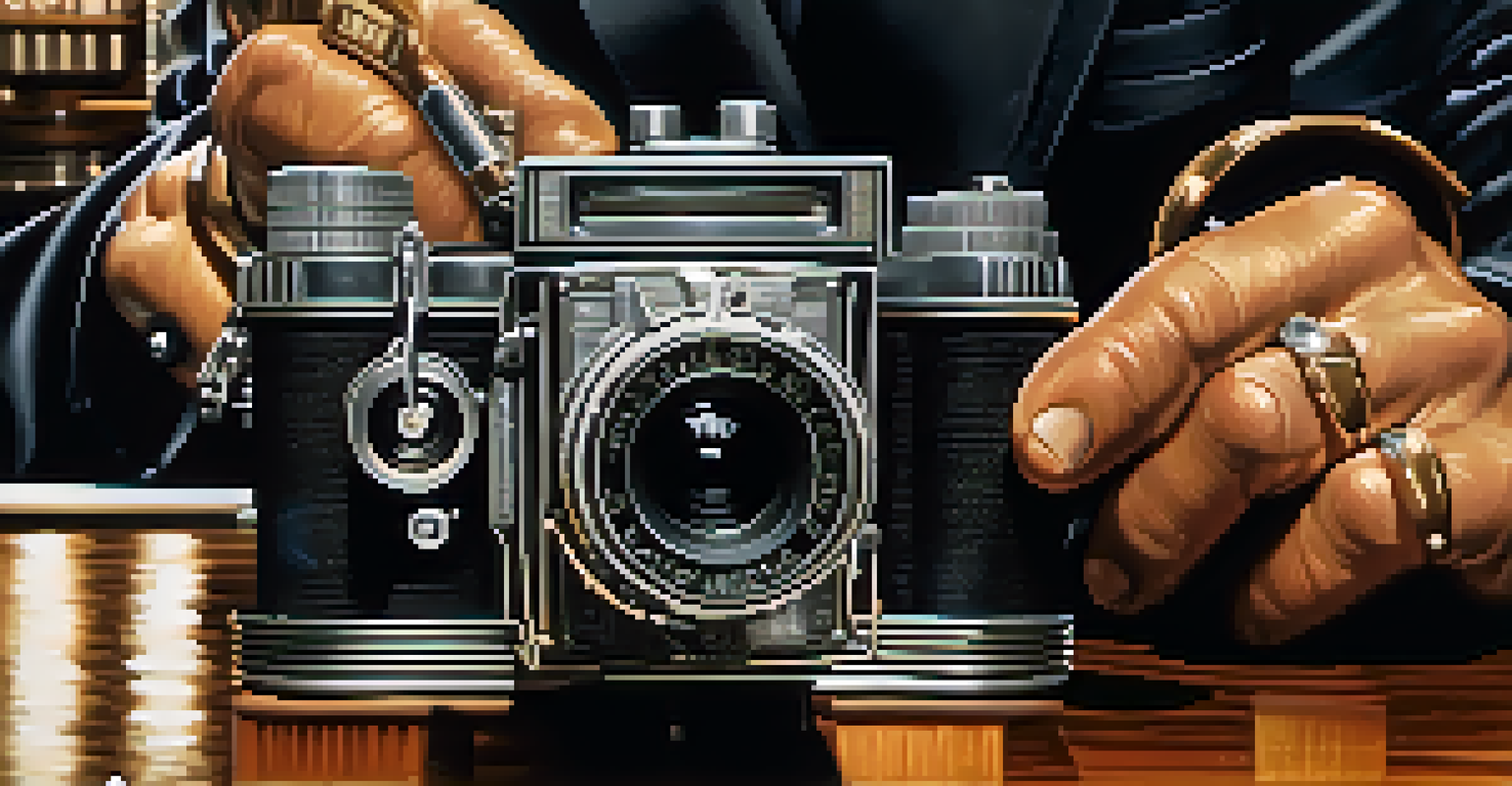The Ethics of Storytelling: Truth vs. Creativity in Film

Understanding the Role of Ethics in Storytelling
Storytelling is a powerful tool that shapes our understanding of the world. It can inspire, educate, and provoke thought, but it also carries ethical implications. Filmmakers hold a responsibility to their audiences, particularly when portraying real events or sensitive subjects.
Storytelling is the most powerful way to put ideas into the world today.
When ethics come into play, the line between truth and creativity can blur. Directors must consider how their creative choices impact the narrative's authenticity and the audience's perception. This balance is essential for maintaining credibility and respect towards the subjects being portrayed.
Ultimately, ethical storytelling encourages filmmakers to reflect on their intentions and the potential consequences of their narratives. It's about honoring the truth while also embracing the artistry involved in filmmaking.
The Importance of Authenticity in Film Narratives
Authenticity is a cornerstone of ethical storytelling; it connects the audience to the narrative on a deeper level. When filmmakers strive for authenticity, they often create more relatable and impactful stories. Viewers are more likely to engage with a film that feels genuine.

However, authenticity does not mean strict adherence to facts. Filmmakers often weave in creative elements to enhance storytelling, but this can lead to ethical dilemmas if the core truth is compromised. Balancing fact and fiction is crucial to avoid misleading audiences.
Ethics Shape Storytelling's Impact
Filmmakers must consider the ethical implications of their narratives to maintain authenticity and respect towards their subjects.
By prioritizing authenticity, filmmakers can foster a sense of trust with their audience. This relationship encourages a more profound emotional response, ultimately enriching the viewing experience.
Navigating Historical Accuracy vs. Creative License
When it comes to historical films, the debate over accuracy versus creativity intensifies. Filmmakers often face the challenge of depicting real events while also crafting an engaging narrative. This often leads to the question: how much creative license is acceptable?
The stories we tell literally make the world. We create our reality through the stories we tell ourselves and others.
While historical accuracy is important, filmmakers sometimes alter events for dramatic effect. This can lead to a more compelling story, but it risks distorting public perception of historical facts. The ethical dilemma lies in deciding how far to stretch the truth.
It's essential for filmmakers to provide context when taking creative liberties with historical narratives. By doing so, they can both entertain and educate their audience, striking a balance between artistic expression and factual integrity.
The Impact of Cultural Representation in Storytelling
Cultural representation in film is another critical aspect of ethical storytelling. Filmmakers have the power to shape societal narratives and perceptions about different cultures. Misrepresentation can lead to stereotypes and reinforce harmful biases.
To portray cultures authentically, filmmakers should involve voices from those communities in the storytelling process. This not only enriches the narrative but also ensures respect for the culture being depicted. Collaborative storytelling fosters deeper understanding and appreciation.
Authenticity Enhances Viewer Connection
Striving for authenticity in storytelling fosters trust and emotional engagement with the audience.
Ultimately, ethical storytelling in terms of cultural representation requires sensitivity and awareness. Filmmakers must be diligent in their portrayal, as it can significantly impact audience perceptions and foster broader societal conversations.
The Role of Audience Expectations in Ethical Storytelling
Audiences today have heightened expectations when it comes to ethical storytelling. Viewers are increasingly aware of the implications behind narratives and demand authenticity and respect in the films they watch. This shift has prompted filmmakers to reconsider their storytelling approaches.
The challenge lies in balancing audience expectations with creative vision. While filmmakers want to captivate their viewers, they also have a responsibility to uphold ethical standards. Navigating this balance can be complex but is essential for long-term success.
By engaging with audience perspectives, filmmakers can create narratives that resonate deeply while remaining ethically sound. This approach not only enhances viewer satisfaction but also cultivates a more thoughtful and inclusive film landscape.
Case Studies: Successful Ethical Storytelling in Film
Analyzing successful films that have navigated the ethics of storytelling can offer valuable insights. Movies like '12 Years a Slave' and 'Schindler's List' masterfully balance truth and creativity while addressing complex historical narratives. These films exemplify the power of ethical storytelling.
By portraying real-life experiences with sensitivity and respect, these films invite audiences to reflect on important social issues. They demonstrate how creativity can enhance factual storytelling without compromising the core truth.
Cultural Sensitivity is Crucial
Involving voices from represented cultures ensures respectful and accurate portrayals, combating stereotypes and biases.
These case studies highlight that ethical storytelling doesn't have to sacrifice creativity. Instead, they reveal that thoughtful narrative choices can lead to profound cinematic experiences that honor both the subject matter and the audience.
The Future of Ethical Storytelling in Film
As the film industry continues to evolve, so too does the conversation around ethical storytelling. New technologies and platforms are changing the way stories are told and consumed, presenting unique challenges and opportunities. Filmmakers must stay attuned to these shifts.
The future will likely see an increased emphasis on accountability in storytelling. Audiences will continue to demand transparency and authenticity, pushing filmmakers to uphold ethical standards in their work. This evolving landscape will require a commitment to thoughtful storytelling.

Ultimately, the future of ethical storytelling in film hinges on collaboration, respect, and creativity. By embracing these principles, filmmakers can navigate the complexities of truth and creativity, ensuring their narratives resonate with audiences for years to come.